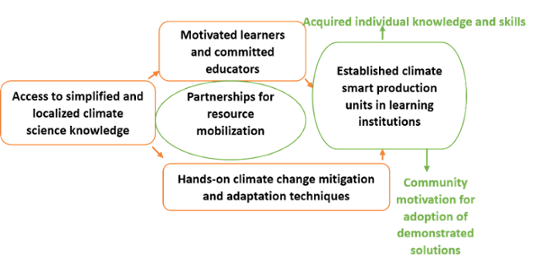Background
This Smart Climate Actions in Zambia (SCAZ) project complements the nationally recognized need to respond to the impacts as well as the drivers of climate change such as extreme weather events in the form of droughts, floods, high temperatures, as well as poor agricultural practices that involve heavy use of chemical fertilizers and poor management of forests, water, and soils for agricultural production. This is evidenced by Zambia’s National Adaptation Programme of Action (NAPA) of 2007, and the National Policy on Climate Change (NPCC) of 2016. The project is therefore set to promote and demonstrate climate smart actions to school going-children in Zambia and inspire community participation in climate change mitigation and adaptation.
This is against a backdrop of limited practical climate change resilience efforts amongst school-going children despite being part of the most vulnerable to its impacts, low prioritization of climate change-related issues in schools, low level of knowledge and awareness about climate science in schools, limited financial resources for climate action in schools, and limited expertise to share practical knowledge and skills necessary for climate change mitigation and adaptation in schools.
Description
The SCAZ project has identified the importance of not only sharing information and generating knowledge for climate change mitigation and adaptation, but the critical need to prove the practicality and/or feasibility of actions that can make a positive social-economic change. In this project, it is believed that once community members observe the reality of utilizing knowledge and skills relevant to climate change mitigation and adaptation, they will be inspired to engage in actions at their level.
This is done through school-based capacity building trainings in climate change science (simplified and localized), setting up of demonstration plots in school production units for climate smart agricultural skills development and peer-to-peer knowledge exchange activities. The project has since 2019 directly trained 250 school-going children and initiated 10 climate smart production units in Lusaka, Mazabuka and Itezhi-tezhi districts of Zambia.
It has also closely engaged at least 10 teachers as conservation club leaders to drive the transformation of school production units as climate smart spaces for knowledge and skills development which demonstrate sustainable solutions.
This has also enabled the growing of 100 agro-forestry and fruit trees in production units. Figure 1 below outlines the SCAZ project conceptual framework.

Impact
The project has made simplified and localized climate science knowledge accessible and usable through the SCAZ Action toolkit and trainings, this is evidenced in stories of learners transmitting the knowledge and skills acquired to peers and their homes. SCAZ has initiated a shift of production units’ practices from the use of chemical fertilizers to organic manure and compost. Its afforestation through agroforestry and orchards establishment contributes to reducing GHG emissions, enhancing carbon sinks and improving water and soil management.
Lessons learned
Climate change science should be simplified and localized: Through unpacking local drivers and impacts, with demonstrations of relevant solutions serving as skills exchange opportunities.
School-based projects with medium to high impacts are attainable with minimal financial resources: The SCAZ model of resource efficiency works with a minimum budget of about USD 250 per site, covering the provision of key initial tools, and undertaking initial school-based trainings locally with partners.